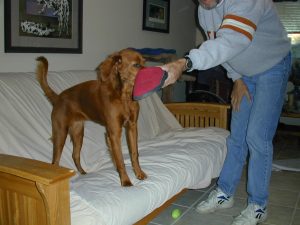 Probably nothing is more frustrating than when your dog tears up, chews up, or in some way damages your belongings. Having lost anything from irreplaceable old family pictures to hundreds of dollars of new plants, we appreciate your frustration. But having a dog means that you will inevitably lose an item you care about to your dog’s teeth or paws. And although on any given day, any dog can turn anything into a chew toy, your dog shouldn’t be routinely destructive.
Probably nothing is more frustrating than when your dog tears up, chews up, or in some way damages your belongings. Having lost anything from irreplaceable old family pictures to hundreds of dollars of new plants, we appreciate your frustration. But having a dog means that you will inevitably lose an item you care about to your dog’s teeth or paws. And although on any given day, any dog can turn anything into a chew toy, your dog shouldn’t be routinely destructive.
First off, take a deep breath and try not to be mad at your dog. Never, ever try to discipline your dog after the fact by showing him what he did. Your dog won’t understand punishment after the fact and this will damage your relationship and can even cause your dog to become defensively aggressive. You wouldn’t come home and punish your dog if your neighbor told you he’d been barking all day because it’s obvious your dog couldn’t connect the punishment to the barking. The same is true for destructive behavior. Dogs cannot connect the evidence of misbehavior with the behavior itself.
Your dog isn’t being destructive because he’s mad at you, to teach you a lesson, or to show you who’s boss. There are many reasons for destructive behavior but spite and revenge aren’t included.
Separation anxiety is a common, but not the only, cause of destructive behavior that occurs only when your dog is home alone. Your dog may also be bored, or may be being frightened by noises or other events. Dogs are opportunists. Your dog may never get in the trash or counter surf when you are home because he knows he’ll be scolded. But these are intensely self-rewarding behaviors when your dog is by himself, because the end result is finding interesting tidbits and nothing bad happens at all! Your dog has simply learned to tell when he will be punished and when he won’t. So not all home alone problems are due to separation anxiety.
Be very, very cautious about crating your dog to manage destructive behavior. If the destructiveness is due to separation anxiety, thunder phobia, or other fear related problems, confining your dog will only increase his panic and likely result in him hurting himself trying to get out of the crate. If you are going to try this option you MUST MUST acclimate your dog to the crate and to being alone in it gradually. We have a crate training protocol on our website with a link on the Terrible Dog Training Book page.
If your dog is also destructive when you are home, it’s likely he’s just amusing himself. Chewing is an enjoyable activity for dogs. Puppies and young dogs need to chew because they are teething, and to explore and learn about their world. Inadvertent destructiveness can also be part of normal play behavior. Meeting your dog’s behavioral needs for play, chewing, exercise, and mental stimulation can go a long way toward preventing destructiveness.